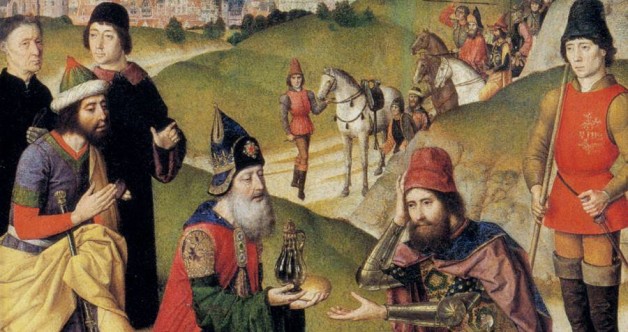Was true holiness possible before the coming of Jesus Christ? What was the point of the Old Law if it could not save? And if grace and salvation come from Jesus Christ, how could people be saints before the Incarnation (cf. CCC 61)? These are some of the most common questions I received this summer, when I was giving talks to members of the Dominican Laity. The answers are all in St. Paul, but it is quite understandable if, having read his epistles, one still doesn’t have all the pieces in place. After all, we have it on the authority of Scripture that in St. Paul “there are some things hard to understand” (2 Pt 3:16).
We may begin by noting that someone who has never heard of Christ or Moses can still come to know certain basic moral and religious truths. He can figure out that the good life for man is a life of virtue, and he can determine, more or less, what the virtues are. He can also ascertain, by reflecting on the visible world, that there is a First Cause, a Creator, which men call “God,” and that he has an obligation in justice to honor God (and nothing else) as God. In other words, he can learn that being good at being human means living a life of human virtue, and that this includes the virtue of religion—giving God the honor and worship that is his due. St. Paul discusses this in the first two chapters of his Letter to the Romans.
But, of itself, does a life of human virtue (including the virtue of religion) earn you a place in heaven? No, it doesn’t. Human virtue can certainly produce a real, though temporary and imperfect, happiness, such as can be had in this life. But if by “heaven” or “salvation” we mean the permanent and perfect happiness that comes from union with the source of all being and goodness—God—then we can see that this is far beyond even the heights of human heroism. It must come as a free gift of God, which is to say it must come as a grace.
God meant us to have grace from the beginning, but, owing to the sin of the first man, we start life without it. God’s plan to restore it is Jesus Christ, and so all grace comes from Christ. The justification and eventual salvation God offers us begins with the grace of faith—faith in Christ. This is St. Paul’s main point in Romans and Galatians. He proves it by pointing out that Abraham, who undoubtedly received the grace of justification, did not receive it by observing the Mosaic law (which he did not know), but rather by faith in the Christ who was to come (cf. Gn 15:6). Likewise, the Letter to the Hebrews (Chapter 11) states that all the righteous men and women of former ages, before and after the time of Moses, were justified by faith in Christ, either explicitly or implicitly.
Now, grace does not do away with nature but perfects it, and so he who has sanctifying grace will not abandon the natural, moral virtues (including religion), but be perfected in them. Thus Abel, justified by the grace of faith (Heb 11:4), worshiped God rightly by offering sacrifice. Since we human beings are not spirit only, but composites of body and soul, it is fitting that our interior dispositions be expressed outwardly in words and deeds. This is where the Law of Moses helped. Without it, there were still some holy men, like Abel and Abraham; but, because of sin, it was very hard to discover how to live and worship God rightly, and very tempting to make choices incompatible with grace. Therefore, receiving the Mosaic Law by divine revelation was a big advantage, even if it was in many ways insufficient.
The ceremonies or “sacraments” of the Old Law, then, served as outward confessions of that faith in Christ which its adherents had by grace, but they could not be genuine causes of grace. In order to be such, they would have had to derive their power from the Passion of Christ, which had not yet come to pass. True, God is outside of time, but when he chooses to work through created instruments, those instruments are subject to the limits of time. Now that Christ has come, ceremonies that confess him as yet to come are no longer appropriate. In their stead, he has instituted the Sacraments of the New Covenant which are truly causal instruments of grace—an incalculable advantage over the “weak and needy elements” of former times (Gal 4:9).
Lastly, it might seem that, if people could be saved by the grace of faith under the Old Law and, indeed, even under the natural law, there must be salvation outside the Church. As St. Thomas Aquinas explains, however, the New Law is principally and essentially the grace of the Holy Spirit. Therefore, whoever has sanctifying grace belongs, de facto, to the New Covenant and, whether visibly or not, is incorporated into the Body of Christ, the Church. This explains the teaching of Vatican II’s Lumen Gentium, which is a contemporary restatement of this ancient tradition. (Note that none of this should deter us from evangelizing and baptizing! See Peter’s example in Acts 10:44–48.)
Let us rejoice, then, in all the saints of the Church, both old and new, and let us not neglect the powerful means of salvation that we are offered in this age of grace.
✠
Image: Dieric Bouts the Elder, The Meeting of Abraham and Melchizedek







